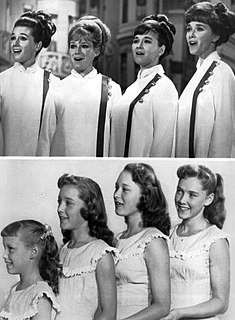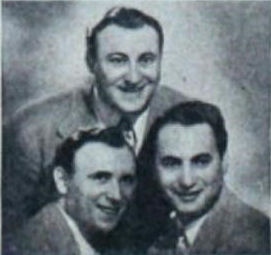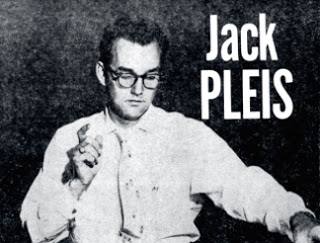
Lawrence Welk was an American accordionist, bandleader, and television impresario, who hosted the television program The Lawrence Welk Show from 1951 to 1982. His style came to be known to his large audience of radio, television, and live-performance fans as "champagne music".

Coral Records was a subsidiary of Decca Records that was formed in 1949. Coral released music by Patsy Cline, Buddy Holly, the McGuire Sisters and Teresa Brewer.

Harry Warren was an American composer and lyricist. Warren was the first major American songwriter to write primarily for film. He was nominated for the Academy Award for Best Original Song eleven times and won three Oscars for composing "Lullaby of Broadway", "You'll Never Know" and "On the Atchison, Topeka and the Santa Fe". He wrote the music for the first blockbuster film musical, 42nd Street, choreographed by Busby Berkeley, with whom he would collaborate on many musical films.

The Lawrence Welk Show is an American televised musical variety show hosted by big band leader Lawrence Welk. The series aired locally in Los Angeles for four years, from 1951 to 1955, then nationally for another 16 years on ABC from 1955 to 1971, followed by 11 years in first-run syndication from 1971 to 1982. Repeat episodes are broadcast in the United States by Public Broadcasting Service (PBS) stations. These airings incorporate an original program—usually, a color broadcast from 1965 to 1982—in its entirety. In place of the commercials, newer performance and interview clips from the original stars and/or a family member of the performers are included; these clips are occasionally updated.

The Lennon Sisters are an American vocal group made up of four sisters. The quartet originally consisted of Dianne, Peggy, Kathy, and Janet. From 1955 to 1968, the group appeared regularly on The Lawrence Welk Show before having their own television variety show, called Jimmy Durante Presents the Lennon Sisters with Jimmy Durante. After their show was cancelled, they partnered with Andy Williams to create a successful Las Vegas residency, which lasted a decade. In 1999, younger sister Mimi replaced Peggy upon the latter's retirement. DeeDee has also since retired. The current line-up of the Lennon Sisters is a trio consisting of Kathy, Janet, and Mimi. They continue to tour around the country and appear annually with their Christmas show at The Andy Williams Moon River Theatre in Branson, Missouri.

Myron Floren was an American musician best known as the accordionist on The Lawrence Welk Show between 1950 and 1980. Floren came to prominence primarily from his regular appearances on the weekly television series in which Lawrence Welk dubbed him as "the happy Norwegian," which was also attributed to Peter Friello.
"Cherry Pink and Apple Blossom White" or "Cerezo Rosa" or "Ciliegi Rosa" or "Gummy Mambo", is the English version of "Cerisiers Roses et Pommiers Blancs", a popular song with music by Louiguy written in 1950. French lyrics to the song by Jacques Larue and English lyrics by Mack David both exist, and recordings of both have been quite popular. However, Pérez Prado's recording of the song as an instrumental with his orchestra featuring trumpeter Billy Regis, whose trumpet sound would slide down and up before the melody would resume, was the most popular version in 1955, reaching number one for 10 weeks on the Billboard chart. It became a gold record. Pérez had first recorded this title for the movie Underwater! (1955), where Jane Russell can be seen dancing to the song. Prado recorded Cherry Pink several times, the best known version being the original hit recording from 1955 and the 1960 recording in stereo. Billboard ranked the former version as the No. 1 song of 1955. The most popular vocal version in the U.S. was by Alan Dale, reaching No. 14 on the chart in 1955.
"The Poor People of Paris" is the English name of a popular song from France.
"(The) Rock and Roll Waltz" is a popular song with music by Shorty Allen and lyrics by Roy Alfred in 1955, although the identity of the lyricist is in dispute. Other sources cite a Dick Ware, Dick Wise, or Dick Wine.
"April in Portugal" is a popular song, also named "The Whisp'ring Serenade." The music was written by Raul Ferrão with Portuguese lyrics by José Galhardo as a fado named "Coimbra", about the city of that name in 1947. English lyrics written by Jimmy Kennedy were set to the music, though many of the most popular versions of the song were instrumentals. It is one of the signature songs of Portuguese singer and fadista Amália Rodrigues. It was also recorded in French by the tenor Luís Piçarra.

"Perfidia" is a 1939 Spanish-language song written by Mexican composer and arranger Alberto Domínguez (1906–1975). The song is sung from the perspective of a man whose lover has left him. The song has also been recorded in English and as an instrumental.
"Twilight Time" is a popular song with lyrics by Buck Ram and music by the Three Suns. Ram said that he originally wrote it as a poem, without music, while in college.
"Laura" is a 1945 popular song. The music, composed by David Raksin for the 1944 movie Laura, which starred Gene Tierney and Dana Andrews, is heard frequently in the movie. The film's director, Otto Preminger, had originally wanted to use Duke Ellington's "Sophisticated Lady" as the theme, but Raksin was not convinced that it was suitable. Angered, Preminger gave Raksin one weekend to compose an alternative melody. Raksin later said, and maintained for the rest of his days, that when, over that weekend, his wife sent him a "Dear John" letter, the haunting theme seemed to write itself.

The discography of the Kronos Quartet includes 43 studio albums, two compilations, five soundtracks, and 29 contributions to other artists' records. The Kronos Quartet plays classical, pop, rock, jazz, folk, world and contemporary classical music and was founded in 1973 by violinist David Harrington. Since 1978, they are based in San Francisco, California. Since 1985, the quartet's music has been released on Nonesuch Records.

The Three Suns was an American pop group, most popular during the 1940s and 1950s.

"This Love of Mine" is a popular American song that was first recorded in 1941 by Tommy Dorsey and His orchestra, with a vocal by Frank Sinatra. Sinatra wrote the words and Sol Parker and Hank Sanicola wrote the music.

Jack K. Pleis was an American jazz pianist, arranger, conductor, composer and producer. He recorded on London and Decca Records in the 1950s, and Columbia Records in the 1960s. During the course of his career, Pleis worked with many artists, including Louis Armstrong, Harry Belafonte, Bing Crosby, Sammy Davis Jr., Benny Goodman, Earl Grant, Brenda Lee, and Joe Williams. Between 1950 and 1976, over 150 songs were arranged by Pleis. His surname is pronounced "Pleece".
Charles Albertine was an American musician, composer, and arranger of the space-age pop era. He is best known as an arranger for Les and Larry Elgart, Sammy Kaye, and The Three Suns, and as the composer of Bandstand Boogie. He also composed music for many television shows.

Bubbles in the Wine is an album by Lawrence Welk and His Orchestra. It was released in 1956 on the Dot label.

Merry Christmas from Lawrence Welk and His Champagne Music is an album of Christmas music by Lawrence Welk and His Champagne Music. It was released in 1956 on the Coral label. The album debuted on Billboard magazine's popular albums chart on December 22, 1956, reached the No. 8 spot, and remained on that chart for three weeks













